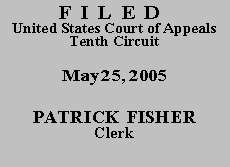

| MICHAEL S. CANDELARIA,
Plaintiff-Appellant, v. JOHN POTTER, Postmaster General, Defendant-Appellee. |
|
Michael S. Candelaria appeals the district court's grant of summary judgment in favor of defendant on his claim for retaliation in violation of Title VII of the Civil Rights Act, 42 U.S.C. §§ 2000e-2000e17. The district court concluded that Candelaria failed to establish a prima facie case of retaliation. Candelaria's complaint also contained a disparate treatment/hostile work environment claim for national origin discrimination, but Candelaria abandoned that claim in the district court. See Aplt. App. at 15, 42. We review the district court's grant of summary judgment de novo, applying the same standard as the district court, Simms v. Okla. ex. rel. Dep't of Mental Health & Substance Abuse Servs., 165 F.3d 1321, 1326 (10th Cir. 1999), and we affirm.
Candelaria is an employee of the United Postal Service (USPS). From 1993 until 2001, he worked in the Stamp Distribution Office of the main USPS plant in Albuquerque, NM under the supervision of Carolyn Gustafson. On December 12, 2000, Candelaria initiated grievance procedures alleging that Gustafson created a hostile work environment for him. On March 5, 2001, Candelaria received a 14-day suspension letter for failure to provide his supervisor, Gustafson, with medical documentation for a December 13, 2000 absence from work. Candelaria never served the 14-day suspension and the suspension letter was subsequently removed from his personnel file.
To establish a prima facie case of retaliation, Candelaria must show that (1) he engaged in protected activity; (2) he suffered an adverse employment action; and (3) there was a causal connection between the protected activity and the adverse employment action. See, e.g., Duncan v. Manager, Dep't of Safety, 397 F.3d 1300, 1314 (10th Cir. 2005). Candelaria cannot meet the second prong of this test. "An adverse employment action must be materially adverse to the employee's job status . . . . The adverse action must amount to a significant change in employment status, such as firing, failing to promote, reassignment with significantly different responsibilities, or a decision causing a significant change in benefits." Id. (internal quotations omitted). Candelaria argues that the 14-day suspension letter constituted an adverse employment action. Candelaria, however, did not end up serving the suspension and the letter was removed from his personnel file. As a result, Candelaria cannot demonstrate that the letter was materially adverse to his job status.
Candelaria argues, for the first time on appeal, that the suspension letter was an adverse employment action because it caused him harm. He states that after receiving the letter he "passed out . . . went to the hospital, suffered a concussion, and later received psychiatric treatment." Aplt. Br. at 19. Generally, we do not consider arguments raised for the first time on appeal. Walker v. Mather (In re Walker), 959 F.2d 894, 896 (10th Cir. 1992). Even if we were to consider the merits of this argument, while Candelaria may have had an adverse reaction to the letter, there is no evidence of an adverse employment action amounting to "a significant change in [his] employment status." Duncan, 397 F.3d at 1314.
Candelaria also argues that he adequately alleged a claim for a retaliatory hostile work environment and that this constituted an adverse employment action. He asserted in his complaint that the severity of the existing hostile work environment increased after he participated in protected activity, but then he abandoned his hostile work environment claim in the district court, stating that it was unsupported by the evidence of record. See Aplt. App. at 15, 42. If there was no existing hostile work environment, then Candelaria cannot claim that any such environment subsequently worsened after he engaged in protected activity.
Because Candelaria cannot demonstrate that he suffered any adverse employment action, he cannot establish a prima facie case of retaliation. The district court's decision to grant summary judgment in favor of defendant was proper. Accordingly, the judgment of the district court is AFFIRMED.
Entered for the Court
Circuit Judge
*. This order and judgment is not binding precedent, except under the doctrines of law of the case, res judicata, and collateral estoppel. The court generally disfavors the citation of orders and judgments; nevertheless, an order and judgment may be cited under the terms and conditions of 10th Cir. R. 36.3.